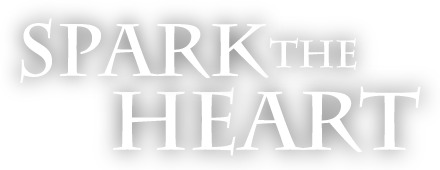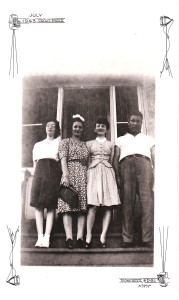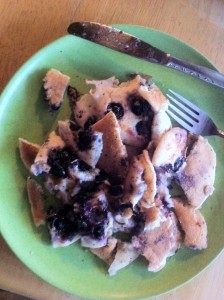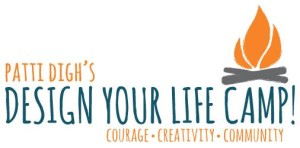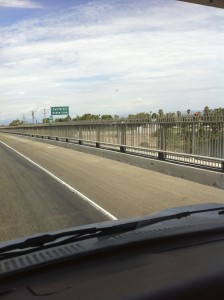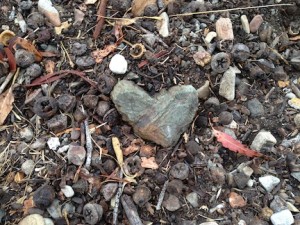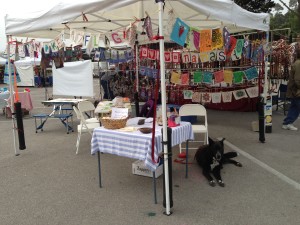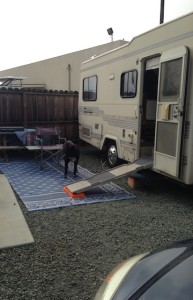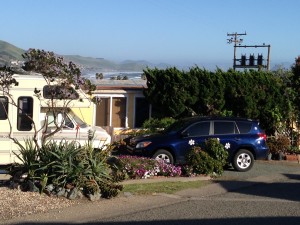Stories from a Jewish Kitchen
When I think of my grandmother, Bub, I think of food. Potato and lox soup, boiled in an aluminum pot on the stove, soup meat stringing off marrow bones and gefilte fish made from scratch. On Gefilte Fish Day, Bub pushed slabs of raw carp through the electric meat grinder. The smell was so ripe that I had to run through the kitchen holding my breath and nose to avoid the odors. I never stayed to watch her form the wet mixture of fish and chopped carrots into mounds and cover them with a filmy gelatin. But by the time the gefilte fish was cooked and served with spoonfuls of nose-burning horseradish, it was delicious.
Bub was a small woman, no taller than five-foot-three, with thick wrists and ankles. She came to the United States in 1915 from Schrednek, a farming village in Lithuania. “We made cheese and butter and I helped out in the shop,” she told me. “I was seventeen and there was nothing for a girl to do, either to be a maid or stay home. So, I told my parents I wanted to go to America.”
She came over on the boat from Germany and lived in New York with her older sister and brother-in-law, who got her a job sewing collars in a sweat shop. “I was a greener,” she said. “I didn’t know from nothing. But if you told me one thing, how to make, how to do, I remembered.”
When the boss told her she would have to iron, she said no. “I wouldn’t do it. I wouldn’t stand and iron and have the steam and everything to go on me, and I quit.” She got a job at a union shop, sewing chiffon blouses for fifteen dollars a week.
Bub was dating a boy from the old country when she met my grandfather. “That boy was educated and I didn’t want him to be ashamed of me because I’m a greener,” she said. “And my husband was crazy about me. I felt, better I should marry a little lower, so he should look up to me, then I should look up to him.”
She married my grandfather and moved to Philadelphia and, a year later, my Uncle Joe was born. “My husband never wanted I should work,” she told me,” but I always kept a nice house.” She made curtains for all the windows and every week she bought something new for the house. “ I always got what I want,” she said. “When he said no, it was no, and a day later, I start to explain him, and I always got what I want.”
Bub and Pop had three more children over the next twelve years. My mother, born in 1930, was the youngest. I have toddler memories of the house on Jackson Street where my mother grew up. My cousins and I played grocery store with the wooden cases of ketchup and seltzer that Pop stored in the basement. I even have a picture of me, not quite three, in front of the brick-porched house, feeding a sugar cube to the milkman’s horse.
Mostly I remember the apartment on Large Street. The living room was always neat. There were no toys, just a room full of old-fashioned furniture: the red flowered couch, chairs with lion’s legs and dark walnut end tables, each with a cut glass candy dish filled with fruity hard candies from Israel. In the summers the window air conditioner never cooled the room enough to dry the backs of my legs, sticky-stuck against the plastic slipcovers.
For Passover every year, we went to Bub’s. Pop sat at the head of the dining room table and two card tables extended the other end all the way into the living room so that my aunts and uncles and cousins could fit. Halfway through the service, the table filled with bowls of chicken soup with rounded kneidels floating on top, then gefilte fish, roasted chicken, string beans, sauerkraut and potato kugel. Bub’s chair was closest to the tiny kitchen, but she was so busy bringing food and clearing plates that I don’t remember her ever sitting in it.
After Pop died, Bub lived in the apartment alone for nearly ten years. My family visited once a month and whenever we left, she tucked a five dollar bill in my hand. Sometimes, in the summer, I was there on a Tuesday, Bub’s card playing day. She and her friends sat around the dining room table playing rummy and poker for pennies. But I never understood much of what they were saying because they all spoke Yiddish.
Bub had gone to night school to learn English when she first came to America, but she didn’t understood what the teachers were saying. “The neighbor boy came over after school and I gave him a dollar to teach me the abc’s. But the phone always was ringing.” She never did learn how to read or write in English, but every week she read the Yiddish newspaper, The Foreword.
When Bub came to visit us on Long Island for a few weeks every year, we’d invite all my teachers over for her famous potato latkes. Bub would start early in the morning, peeling and hand–grating dozens of Idahoes into an oversized bowl of wet brown mush. Closer to lunch time, she’d ladle the batter into the frying pan of sizzling oil and cook them until they were brown and crisp, just this side of burnt. Some were browner than others because she’d sit down to eat a latke while it was still hot and forget she still had more cooking on the stove. She’d bring the latkes out by the plateful, spatula in hand. Even after she’d blotted the pancakes with a paper towel, they still left translucent outlines on the paper–lined serving platter. I would have already eaten a dozen latkes by the time she had fried the last batch and joined us at the table, still in her apron, beaming in the compliments.
Bub was in her late seventies when she came to live with my family in Arizona. She hated leaving the few friends she had that were still alive, and especially leaving my Uncle Joe, her favorite. My father tried to get her to go the Jewish Senior Center but Bub refused.
“My mind doesn’t work right,” she told me. “I never go into a conversation, you know why? I don’t hear good and I’m afraid maybe I’ll say the wrong thing. I don’t want people should think I’m a dummy.”
Bub spent most of the day in the kitchen, cooking, and her fingers were always greasy. Greasy from pulling the pin feathers off the kosher chicken with a paring knife against her thumb. Greasy from rolling ground beef, eggs and matzoh meal into walnut-sized meatballs. Greasy from skimming the fat off of yesterday’s chicken soup. My mother followed behind, wiping the trail of fingerprints that Bub left on the cabinets and refrigerator door.
Some days, when her hands hurt too much, I helped her get dressed. I was always a little embarrassed as she stood in her room in her underwear, her breasts filling only the bottoms of the white cotton cups of her brassiere. She held her pink corset with the long metal stays against her body as I methodically laced the strings through the dozen metal eyelets.
Often she would tell and retell stories of shopping for coats on South Street, my mother’s wedding, the summers she spent at Atlantic City. “I remember everything, but now, from one thing to another, I’m a dummy,” she’d say to me, dabbing her rheumy gray-green eyes with a Kleenex that she kept tucked in her brassiere.
I interviewed Bub for a women’s studies class when I was in college. I was uncomfortable asking her questions about birth control and sex, but she was willing. She said it was the man’s responsibility to prevent pregnancy. She told me that, after my mother was born, she had an abortion.
Abortion was illegal then, except for medical reasons. “The doctor told me I couldn’t have another child on account of my heart. Six doctors examined me to make sure I should be allowed to have the operation.” She was in the hospital for ten days, and when she came home she started hemorrhaging.
“It was Sunday and I was in the kitchen making chicken and I felt a gush to the floor.” The doctor came and packed her up with gauze and gave her medicine so she wouldn’t fall asleep. “I was bleeding so much if I fell asleep, I could bleed to death,” she said. “Then, twelve o’clock midnight the bed got wet again. The doctor came right over and he explained me everything.” She had been in the second trimester of the pregnancy and they hadn’t gotten everything out. “Now,” the doctor told her, “You’ll be alright.”
On my visits home from college to my parents’ house, Bub asked me to clean her earrings for her. She had a special toothbrush that I dipped in rubbing alcohol. I brushed the white-gold posts and polished the edges of the half-carat diamonds that her children had given her for her 50th wedding anniversary. Then, with a cotton ball, I swabbed the stretched out holes in her earlobes.
One afternoon after I cleaned the earrings, she handed them to me. “I want you should have them.” I didn’t want to insult her, but wearing big diamonds was hardly my style. Still, I put them in my ears, not knowing what else to do with them and I’ve worn them ever since.
Then Bub had a stroke. She wandered the house in the middle of the night. She often left the burner lit on the stove. My mother changed her diapers and spoon fed her in bed.
The last time I saw Bub was the first night of Rosh Hashana. She lay in her bed, mouth agape, oblivious to who I was. That night at the synagogue, while everyone prayed to be inscribed in the Book of Life for another year, I begged God to let my grandmother die. Two days later, she died at home in her bed. My mother held a mirror under her nose to make sure she wasn’t breathing.
Almost thirty years later I realize that, for all the cooking that Bub did, she never passed on her recipes. Nobody knows exactly how much matzoh meal she put in her latkes or how much sugar went into her chicken fricassee. And no one in my family makes gefilte fish from scratch.
But she did tell me her stories. And when I replay the tapes, it’s as if we are still sitting together in my parents’ kitchen, her stockings a little saggy around her swollen ankles. I see her blue leather shoes with the small square heel and the bulge on the sides where her bunions protrude. I see her wrinkled cheeks and I remember how soft her face was when she pressed it to me in a goodbye kiss.
How Not to Live in the Past
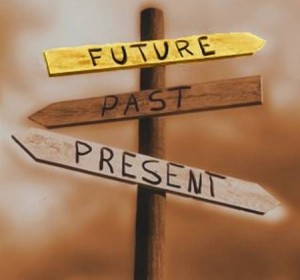
Marika and Mabel went back to Arizona yesterday. It was great to spend so much time together and sad to see them go. Sure, we had some moments of tension and disagreements, but, after all these years, we’ve found ways to talk or not talk our way through them. Sometimes there is even compassion and understanding as we work through the friction.
And because we show up so present and honest, there are no regrets anymore. Not even when she told me that she no longer has any immediate plans to move to CA.
That was an old dream that we shared.
But things change.
We will see each other again in October when we travel together to Georgia and I’m sure she’ll be back on the coast in the next six months for another fun visit. And, of course, we will talk on the phone, and FaceTime and email and continue to shift and grow and love each other in ways that support us both. This is living in the present. This is what true love is all about.
__________________
I received an email last week from a reader asking how she could stop regretting her life and be happy.
Regret is a sign that we are living in the past, stuck in what was, what wasn’t, what might have been.
Some regrets are small. We feel bad that we forgot to send someone a birthday card. Other regrets are bigger. We wish we had spent more time working on a past relationship gone bad.
The first question to ask yourself is: Is there some action I can take today to change the situation?
In the case of the forgotten birthday, we could still send a card. After all, there is a whole line of Belated Birthday Wishes.
As for the past relationship, there may be nothing you can do to change the outcome. And so you have to find a way to make peace with that regret and let it go.
Shifting our focus to the Now, the Present Moment, is the easiest way to move from that place of regret.
Connecting with our breath and just breathing can calm us into the present moment.
If we are consciously breathing, following our breath inside and then out, we are no longer anywhere except here.
And in the Here and the Now, there is no past, there is no future. There is no regret.
I suggested to my reader that, every time she found herself “living in the past” or feeling some kind of regret, to immediately notice it, acknowledge it, and shift her focus to something right here, right now, in the present moment.
Maybe it is watching the birds, or playing with the dog, or smelling some spices in the kitchen.
Engaging our senses moves us out of our heads where we get stuck in our old thoughts and patterns.
Saying thank you for something or someone in our present life can immediately shift us into the Now.
Perhaps it’s time to write a letter to your past….acknowledge it, thank it, grieve it, so you can let it go. Then burn the letter, releasing it to the fire and the air.
The more we can “train” ourselves to shift out of the past and into the present, the less often we will feel regret.
I’d love to hear your thought. Just click on the Comments button below to add yours.
What I Learned From Making Blueberry Pancakes
As a kid I often ate waffles and ice cream for breakfast. Or a bowl of Lucky Charms without the milk. Or Sugar Pops, without a spoon, one sweet, sticky kernel at a time.
On weekends we’d have bagels and lox and whitefish from the deli. Sometimes my father made scrambled eggs with thick round slices of Hebrew National salami, or French toast with Log Cabin syrup.
But I don’t remember ever having homemade pancakes. The only time I remember eating them was on those rare occasion that the family would go to IHOP for breakfast and I would order a plate full of silver dollars with no butter. I’d drown them in the thick brown maple syrup from the fancy pitcher with the sticky metal spout.
My first attempt at making pancakes from scratch was for my friend’s 20th birthday. I mixed the flour and milk according to the recipe and poured the batter into the frying pan. I didn’t know that the pan needed to be hot before you started, or that you shouldn’t flip them more than once on each side.
My dream birthday breakfast turned into a battery burned mess, the apartment filled with smoke and my friend laughing at my lack of pancake making skills.
That was 32 years ago and, while I love to eat pancakes, in all those years I have never tried to make them again.
But several weeks ago I bought a box of Bisquick instant pancake mix (just add water) and a bottle of real maple syrup from Canada. I had an inkling that I wanted to try again and, since both items have a long shelf life, I wasn’t under any pressure to make them right away.
But last night I had a craving. So I pulled out the box, measured out the mix, added the water and whisked it together. I coated the frying pan with non-stick spray like the directions said, put the flame on medium heat and let the pan get hot.
Then I poured a four inch blob of batter into the pan and dotted the pancake with some fresh blueberries.
And I watched the clock, waiting.
The directions on the box said to flip it after a minute or a minute and a half, or when the edges started to brown.
I guess my pan wasn’t hot enough because when I peeked my spatula under the pancake, the bottom was still white and sticky.
So I waited some more.
As I stood there, watching the blobs of batter in the pan, I realized that this is why I don’t like cooking.
Because it is a lot of waiting. And not doing.
They say that, how we do one thing is how we do everything.
As I stood over the hot pan, watching for the edges to brown, it became very clear to me that I am a do-er, not a wait-er. I’m a person of action, of results, of energy in motion.
This doesn’t mean that I can’t sit still. Because if sitting still is the thing that I am doing, then I’m fine with it.
But when I think about how I step into any new habit, or begin a new project, I see how much I don’t like to just wait.
Even though I know that life is a flow of action and non-action, and that there needs to be space in between, I am always doing something else while I am waiting, keeping busy, stirring another pot of possibility.
I am never just doing nothing, waiting for the next step.
And it occurs to me that maybe I wouldn’t feel so scattered and unfocused if I leaned into this waiting space and didn’t try to fill up every minute with doing something, or something else.
Waiting is about giving up the need for control. It is allowing something to happen in its own time, giving a thing or a person the space to bloom, ready, or, in the case of a pancake, time to brown.
I guess I need to make pancakes more often so that I can practice waiting for things to happen in their own time. Without control. Without impatience. Without doing anything else.
As for my first batch of blueberry pancakes, I won’t lie and tell you that they were the best pancakes I’ve ever had. But they weren’t the worst either.
I drowned them in the maple syrup from Canada and was pretty proud of myself for sticking with it. And especially proud for seeing how this simple act of making pancakes could teach me something about how I do everything else in my life.
How do life lessons appear in your life? I’d love to hear your stories. And if you have a great recipe for homemade pancakes, I may just give it a try. Just click on the comments below.
The Thrill of Camp
I never went to sleepover camp as a kid. The idea of being away from home and sharing a cabin with strangers was the furthest thing from my idea of fun. But when Patti Digh announced her Design Your Life Camp, complete with inspiring speakers, art-making and a talent show, I leaped at the opportunity.
Some of my favorite teachers and writers will be offering workshops and there’s even a full-day writing course the day before camp begins. This is a real gift to myself to indulge in so much creative fun. And I’ll finally get to meet many friends I’ve connected with on Facebook and spend time with other friends who I haven’t seen in a few years.
As if that all wasn’t enough.
Patti also invited campers to submit proposals to be a speaker on the topic of courage, and also to lead creative art sessions.
Of course I submitted proposals for both.
And both of my proposals were selected!
Can I tell you how excited I am?
One of my next big dreams is to speak to groups, encouraging folks to claim their own dreams and offering tangible, do-able action steps to make it happen.
My seven minute motivational camp presentation is entitled, “The Courage to Give Up a Good Life for a Great Life,” and it is the story of how I manifested my own dream to leave my life in Arizona to live and work at the ocean. During the speech I offer folks inspirations and strategies for beginning their own journey towards that thing that makes their whole being light up.
And my creative session is a direct follow-up to this speech, giving campers an opportunity to take action and make their own travel-size dream altar so that they have a touchstone to keep them focused on their dream.
Even though camp isn’t until Oct 2, I’ve got a lot of work to do before then. I have a speech to write and slides to create. (They’re going to be mostly beautiful pictures of the ocean and the beach.)
And I’ve got to get my art supplies to Atlanta so I don’t have to carry them on the plane with me.
I’m sure my excitement and my big WHY will keep me energized and working and I’ll be ready in no time.
And hey, if you want to join me at camp, there are still spaces left. Check out the website for all of the details.
Looking Back to Move Forward
Exactly one year ago I pulled my RV into the Morro Strand RV Park with the intention of staying in the RV long enough to find a house to rent. Living here, I would connect with the local Apple stores and continue to provide one on one onsite training for Mac users.
My bigger why for choosing THIS area, this small beach town off the beaten path on the central coast of California, was so that I could be outside more, walk more, breathe deeper, write every day and explore how else I wanted to do my best work in the world.
Fast forward 365 days and I am, once again parked in the Morro Strand RV Park.
But nothing else from that day last year is the same.
I stopped looking for a house to rent when I realized how much I prefer living in my 24 foot motorhome. I have everything I need: bathroom, shower, microwave, bed, ample room for my printer and technology, unlimited wifi, and it’s relatively inexpensive, especially compared to renting a house with the same beach access.
And I don’t do any on-site training. I now work with clients all over the world through the magic of virtual technology, both one on one and in group classes.
I am walking much more than ever before and feeling more present and flexible in my body. And, until the summer began, I was writing every day.
If I had known how brave I’d have to be to move to a place where I didn’t know anyone, I’m not sure I would have been able to do it. But I’ve found ways to meet people and, once I realized it would take some time, I eased into the unfolding of it all.
Even though I have wheels underneath me, I have no desire to travel. For me, it’s more about settling in, connecting to the community here. And so I have joined a new yoga community where I sometimes co-teach a yoga and writing class. I am now a recognized regular at my favorite Taco Temple restaurant. And I’m the Hospitality Chairperson for the annual Morro Bay Winter Bird Festival.
There are days when I berate myself for not doing more. I still haven’t gone kayaking, or connected with the folks at the indie bookstore or explored options to lead more workshops.
Is it laziness or is my plate still pretty full with change? Have I fallen into such an easy rhythm of life on vacation that I’m slacking off on the growth?
Every time I think I am not doing enough, my friends remind me that I am brave and courageous and living my dream, one day at a time. They assure me that I am on the biggest adventure of my life and that I am doing exactly what I need to do, at the right pace.
And so, from this day forward, with curiosity and kindness and an open heart, I choose to focus on gratitude for what is now and what else I want to dream and where I might see myself 365 days from now.
Listening In
It was a hard week last week. The stress of the weekend festival and sitting outside in the blowing winds really knocked me for a loop. Everything settled in my chest, of course, as a deep hacking cough. My body was sore, I had no appetite, my head was stuffy and I really couldn’t think clearly.
All I knew was that the vendor’s life was not for me.
And yet I felt an obligation to still participate in the Morro Bay Merchants Street Fair in August, since I’d already reserved a booth and told people I’d be there.
I felt that I should do it because it’s for a cause bigger than me. And couldn’t I, just once, think beyond my own comfort and needs?
I thought of people with jobs that are always this hard. Construction workers who haul heavy things all day long, nurses who work 12 hour shifts, lifting people twice their size, with no breaks for lunch or even the bathroom, and the road crews in Phoenix who stand outside in blazing hell heat, spreading hot tar on melting black asphalt, and roofers in attics when it’s 120 OUTSIDE… and farmers and crop pickers, and bakers who have to get up so early in the day to start the dough.
So why should I have it so easy?
But each time I envisioned setting up and taking down my booth for the one day event, my whole body reeled. And it wasn’t just the physical labor. It was some deeper knowing that, yes, more people would be at the fair, but was it really the best venue for the Prayer Flag Project?
But with the stuffiness in my head, I couldn’t tell what was the real truth. And the biggest surprise was how much I was torturing myself with it.
That’s when I got sick.
I called my dear friend Marika and cried and shared how I was really feeling. She supported my choice either way about doing the fair and suggested that I wait until I felt better to decide for sure.
But I knew, even in the haze of my head cold, that giving myself permission to cancel wasn’t enough. I had to decide and do it if I wanted to start feeling better.
So I emailed the organizer and cancelled my booth, even though I probably won’t get a refund.
Sure, I’m disappointed that I won’t experience the good stuff of the event: connecting with people, watching kids make their own flags, seeing people really feel the love of the project.
But I also know…I’ll find another way…
So I am not doing the street fair this weekend in Morro Bay. But I will attend as a spectator since it should be a fun afternoon outing.
As for the Prayer Flag Project, I am already making lists of who I can contact to co-create some special events that feature the project as a joint fundraising activity. Of course, I’ll keep you posted.
Journal from the Prayer Flag Project
Friday evening:
The RV is parked and we are settling into our weekend home at the back end of the Vet’s hall parking lot in Cambria for our inaugural Community Prayer Flag festival event. My EZ-UP tent is set up, thanks to the help of one of the event coordinators, and Laddy and I are now relaxing as the sun goes down.
 Highway 1 is loud behind me, the dinette window faces the parking lot where the fair be. Looking east, past the tents, past Main Street is Happy Hill, a very steep mountain with worn dirt roads that lead up to four story houses built into the side of the hill. Pine trees, thick and tall, tower twice as high as the houses.
Highway 1 is loud behind me, the dinette window faces the parking lot where the fair be. Looking east, past the tents, past Main Street is Happy Hill, a very steep mountain with worn dirt roads that lead up to four story houses built into the side of the hill. Pine trees, thick and tall, tower twice as high as the houses.
Right now there are only a handful of booths set up. I can see my booth, the white canopy top flapping a little in the breeze, the concrete-weighted cylinders that are suspended alongside the canopy legs keeping everything stable. My chairs and tables are piled on the ground under the canopy for set up in the morning when I’ll also string the rope and then clothes pin the flags all around the booth. I can’t wait to see them all flying in the breeze. It’s going to be beautiful!

Saturday evening:
It turns out it’s a pretty small fair. Only half of the booth spots are filled. People trickled by all day, some walking right past my booth to the noisy wind chimes behind me. Others stopped to look, touch, ooh and aww at the beautiful flags. One woman shared that she was having heart surgery this coming week and that she could use all the prayers she could get, so I invited her to stand in the middle of the booth and feel the love.
A couple from LA was so touched by the project that they invited me to participate in an event at their synagogue in March. They bought a set of blank flags to show the committee.
 And the folks from the campground with their twin teen grandsons came and it was fun to talk with the adults while the boys enjoyed drawing mandalas.
And the folks from the campground with their twin teen grandsons came and it was fun to talk with the adults while the boys enjoyed drawing mandalas.
But it was a long day with very few actual sales. In the evening, Laddy and I walked around to stretch our legs but I was in bed by nine, to get ready for another day.
Sunday morning:
We slept well, and I took my time getting out to the booth for the 9 am opening. And this time Laddy joined me. He was happy to sit in the middle of the booth, watching people, sniffing, even letting people pet him. After an hour I took him back to the RV so he could relax.
More people came but still, there were very few buyers. In fact, most of the vendors were complaining about poor sales. And yet, I didn’t let it get me down. I focused on WHY I was doing this as I watched the wind blow the flags and carry all of the love and good wishes into the breeze. And I continued to invite folks to experience my booth of love.
 Two young sisters sat down with their mom and grandmom and it was a delight to witness three generations of love at one table.
Two young sisters sat down with their mom and grandmom and it was a delight to witness three generations of love at one table.
Two different people said I should contact the Art Museum and the Children’s Museum in San Luis Obispo. And one woman, a long time cancer survivor, encouraged me to contact the Hearst Cancer Center.
A teen girl approached the booth, her face beaming and she said, “You are so lucky. It’s all so beautiful!”
Some folks talked about how they were going to go home and do this with their kids, and others mused that they could even make a quilt with the squares.
I loved all of the connecting and sharing but, by three o’clock, I was ready to pack up and be home. At four thirty I started unpinning the flags and folding them up. One of the organizers helped me fold down the canopy and I took my time loading everything back into the RV before driving home. After sixteen hours of booth sitting, I made $60.00.

Sunday evening:
I was so exhausted when I pulled into the RV Park. I had to first move my car out of my spot, then back the RV in. The park ws surprisingly full and there was a very long trailer parked opposite my spot, making the turn to back in really tight. I was so tired that I just didn’t want to do it.
So I said to the man near where I had pulled up my car, “I’m so tired I wonder if you could…” and before I could finish the sentence he put down his bbq fork and said, “do you need help backing in?”
Yes, please.
Good thing, too, because I would not have been watching the top overhang of the RV as I made the precarious turn. But he was watching and we backed in on the first try.
I plugged in the electricity and recharged all of my technology but decided to save hooking up the sewage until I’m ready to dump again. I did reconnect to the main water supply so I’d have better water pressure in my morning shower..
As for the fair, it was not a monetarily profitable experience. But, as experiments go, I got a lot of bang for my buck.
I learned that I loved interacting with the kids who sat down to draw. encouraging them to draw whatever they felt, offering samples, checking to see if they needed more prompting or not. And how delighted they were with their creations.
I loved hearing what a great project this is, how people’s faces lit up as they touched the artist made flags hanging all around the booth.
And I’m convinced that the project is worthy of pursuing.
It manifests and generates love and well wishes in the world through something beautiful and accessible to everyone.
It offers people an opportunity to share love, blessings, prayers for themselves, someone they know, the whole world.
And the artist-made flags make the booth so beautiful and inviting and inspiring.
But this festival vendor life is not for me. It’s too physical-the heavy weights, the tables and chairs, and all of the sitting! I am so grateful for Laddy-he motivated me to get up and take walks. And I stretched. But I am stiff, and achy, and tired. To the bone tired.
In the next few days as I rest and recuperate, I’ll assess and re-assess what worked, what I liked, and what needs to change.
But for now, I’m just feeling the love.
I’m so grateful to the artists that created flags that made the booth so beautiful. I’m grateful to the folks who stopped and noticed and connected with the project. And I’m so grateful to you, dear reader, for cheering me on and being a part of this growing project.
Feel free to leave a comment below!
Loving What Is
I’ve been at the new RV park for two weeks and even I am surprised at how easily I have settled in. I love being in the midst of all of the summer activity of campers coming and going, watching the families, talking with folks, even if it’s just to say good morning. There is more movement around me, a diverse mix of people and demographics, families and seniors and, this weekend, several gay male couples.
Last weekend my neighbors were vendors at the Art in the Park festival. I talked with them about their booth, the crowds, and, on Sunday, I even took the summer trolley into town to stroll through the park.
Morro Bay is a tourist town and, even though I’m on the north end of town, out of the direct crowds, I still like feeling like a part of the fun. And I love, when we ask each other hold long we’re staying, that I get to say, I’ll be here through Labor Day.
Knowing this is my home grounds me. I’m not searching for a house, lamenting where I am not, or focusing on what’s not perfect. I am completely here.
And I am loving what is.
I love the constant sounds of the gulls, calling from their perch on the lamp posts, crying as they fly, kow, kow, kow, not quite in sync with the flapping of their wings.
I love waking up to a cool gray sky, Morro Rock completely covered in marine layer fog, and being able to wear a sweatshirt in the early mornings and evenings.
Laddy and I take our long morning walk through a canopy of Monterey pines that parallels the tall dunes and the ocean. The ground is mulchy and soft, easy on our hips and joints and, when I stop to listen, even if I can’t see the water, I can hear the waves rolling. The trail is stick heaven for Laddy and I pick one up and throw it for him to bound after and immediately find another to throw.
One thing that has been a challenge is that the campsite is gravel. The large, jagged rocks are hard on Laddy’s feet, even with the outdoor carpeting. And the RV sits higher up and his ramp into the RV is much steeper.
Last week he jumped down as usual from the RV but, instead of using the steps he took the three foot leap and stubbed his toe in the gravel. He didn’t cry but he was definitely limping. We took a short walk then he went back into the RV. But later that afternoon, he refused to come down.
I started imagining the worst, that if he could no longer get in and out of the RV, I’d have to put him to sleep. And I was a basket case.
Friends suggested he just needed to rest, that perhaps I could set up the ramp for coming down too. He hesitated, but I lured him with some turkey pastrami and now he is using the ramp for getting in and out of the RV.
I am no longer spinning into the future with grief, but grateful that I found a solution that he is willing and able to work with it. He’s no longer limping and I even found a way to raise the ramp so it’s not quite so steep.
Sure, it’s a lot easier to love what is when Laddy isn’t limping, and my hormones aren’t raging. But this is a great way to practice, to find the small things in each day, each moment, to embrace and say thank you.
And when Laddy IS limping, it’s an opportunity for me to tune in deeper to his needs, to find new ways to support his tender joints, to appreciate just sitting with him and looking into his rich orange-brown eyes and feeling the love.
Roadblocks and Detours
In celebration of FOUR YEARS of writing this weekly blog (!!!) I’m re-posting one of my very first articles, about how our thoughts often hold us back from our dreams.
Thank you for your support, your readership and for joining me on this amazing journey!

Imagine you are driving down a road, admiring the scenery, going at a steady, comfortable pace. You know you are on your path, headed in the right direction.
Suddenly, you have to stop because a giant, thick-trunked tree has fallen across the entire width of the road.
You get out of the car and assess the situation. Maybe you’re mad that you’ve been stopped when you were moving so smoothly. Maybe you try to figure out why the tree fell. Maybe you attempt to push it out of the way, see if you can drive over it or around it.
Maybe you just stand there, helpless, idealess, stuck.
It can be very tempting to get so consumed with what is stopping us, that we forget that there are other options. That we can turn the car around and find a new path.
I was working with a client who was so consumed with trying to figure out what was holding him back from growing his new business that the figuring out itself was holding him back.
We talked about ways to step aside from needing to figure it out and possibly just taking a step toward his new business.
I asked him what one thing he could do to feel movement forward. He said, “I have to write a blurb about the business.” Now, this man is articulate, loves to write, knows exactly what he wants to tell people about his business. And so I said, “Really, the blurb is holding you back?” and he laughed, “Yeah, I know.”
So I asked him what was he really afraid of, and, after some thought, he shared that, in his previous jobs, his work consumed his life. He was afraid of falling into that workaholic mentality again. Once he realized that, this time, he was his own boss, and that he could choose when to work and how much to work, that he could document his hours and see how much time he was devoting to his clients, he was able to see the control he really had.
He devised a schedule and a reasonable plan for contacting clients. And that night, he wrote his blurb.
What are your roadblocks?
How can you turn them around?
Please share by clicking on the Comments below.
UPDATE: Four years later, my client has maintained a beautiful balance between work and play. His business has expanded, he travels often and he’s lost 50+ pounds. And every picture he posts on Facebook reflects a content and confident man living the life of his dreams.
Leaving Paradise
I love where I live. I love my neighbors and the quirky community of retirees and working folks, weekend campers and full-time RVers. I love the laid back pace of the sleepy beach town. And, of course, I love having such easy access to one of the most beautiful beaches on the California coast.
When I pulled in last September, I was very aware that, come the summer, I’d probably have to leave to make room for people who have long-standing reservations. So I made my own reservations at the RV Park where I stayed when I first arrived on the coast last August.
Still, I was trying to stir up all kinds of mojo magic that there would be a last minute cancellation and I’d get to stay.
Several friends reminded me that I would end up exactly where I am meant to be. And I realized they were right. So I stopped hoping to stay and started opening to what I could look forward to at the other RV Park.
While the Morro Bay RV Park is more expensive than where I am now, the price does include cable TV and free wi-fi. And Morro Bay is ten degrees cooler and less sunny than here, which is actually a BONUS perk for Laddy and me because neither one of us is comfortable above 75°. It’s closer to town and shopping and yoga and there are lots of great walking opportunities. And there are no hills!
As the holiday weekend approaches, Paradise Park is filling with big families, loud boom boxes and kids riding their bikes up and down the hills, oblivious to the cars driving through. And the big Fourth of July fireworks show at the end of the pier would certainly freak Laddy out, even with his Thundershirt on.
The new park is quieter, smaller and not in a touristy part of town. I’m really going to appreciate that.
So this Thursday I’ll be headed five miles south to the no frills RV Park in Morro Bay. It’s a gravel parking lot with minimal privacy and no view. It’s right next to a spacious neighborhood park and it’s an easy two block walk to a spectacular view of the ocean. It’s a trek over the dunes and soft sand to get to the water, but Laddy and I have done it.
It would be so easy for me to lament having to leave this paradise. But if I focus on what I will be missing, I will be sad and stuck in a feeling of lack. So instead, I’m choosing to embrace what I will be gaining.
And I can always come back to Paradise to visit the neighbors, walk on the beach, even enjoy some fish and chips at a favorite restaurant near the pier.
I’m looking forward to the new experience, the new place, the change in the weather. And I’m sure I’ll also be glad when we come home, after the tourist season is over.
